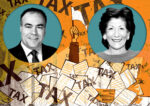Leftover pandemic recovery cash could be turned into tax relief for Chicagoans who are set to endure the biggest hikes in residential real estate assessments.
Alderman Michael Rodriguez of the Southwest Side’s 22nd Ward has proposed using $10 million in such funds, the Chicago Tribune reported.
The idea was also supported by Alderman Maria Hadden, of the 49th Ward, whose section of the far North Side was hit harder than any other ward in the city in terms of its increased property tax burden on residential assets, with a 24 percent increase from Assessor Fritz Kaegi’s previous assessment, according to a recent Cook County Treasurer’s Office analysis. Rodriguez’s ward will feel the third-highest increase in total residential tax burden, of 22 percent from the previous year.
Treasurer Maria Pappas’ office found that commercial landlords’ successful appeals aiming to lower the values at which their buildings would be taxed to blunt the impact of Kaegi targeting them for increased assessments contributed to homeowners bearing more of the burden this year.
As part of Rodriguez’s proposal, the funds would be provided as forgivable loans, while applicants would have to live in Chicago, inside the home they are seeking the loan for and have incomes at or less than 300 percent of the federal poverty guidelines, among other requirements.
Mayoral candidate Jesus “Chuy” Garcia voiced support for property tax relief, while Mayor Lori Lightfoot said officials will look at all methods of easing the increased weight on certain homeowners. But she also said that “$10 million is not going to get the job done,” and suggested pursuing resources from the state and Cook County to assist homeowners facing big tax hikes.
Residential properties in the city’s mostly Latino and Hispanic neighborhoods on the Lower West Side along with the northernmost section of Chicago experienced the most dramatic increases in assessed value and therefore tax burden. Meanwhile, some mostly-Black neighborhoods on the city’s South and West were tagged with much more mild increases in value, leading to big drops in their share of property taxes, such as a 45 percent residential decrease in West Garfield Park.
Kaegi, in an interview with The Real Deal earlier this month, chalked up the variance to the city’s recent changes as well as its historical evolution, citing a lack of gentrification and the rapid rises in home values that come with it in the neighborhoods set for cuts to their tax bills.
Read more


